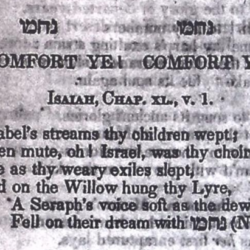| Source (Hebrew) | Translation (English) |
|---|---|
נַחֲמוּ נַחֲמוּ עַמִּי (ישעיהו מ:א) – יֹאמַר אֶשְׂכּוֹל כֹּפֶר, לְנַחֵם אֶת כׇּל־הַנִמְצָא כָּתוּב בַּסֵּפֶר, לָשׂוּם לַאֲבֵלֵי צִיּוֹן פְּאֵר תַּחַת אֵפֶר. | |
על חללי בת עמי – למי הומה עלי. ועל בית אולמי ועל שממות היכלי. מקום הנקרא בשמי, וקראתיו הדום רגלי, שמו אותו לעיים בני עיפה ואפר. |
My heart yearns for the slain ones of the daughter of my people,[5] Jeremiah 8:23 and for the House of My Inner Chamber and the remnants of My Sanctuary, the place called by My name,[6] Cf. Isaiah 43:7 and which I called My footstool.[7] Lamentations 2:1, Psalms 99:5 The children of Eiphah and Epher[8] Genesis 25:1 [Midian] have made her [Yerushalayim] into heaps.[9] Psalms 79:1 |
דברו אל ציון וקראו אליה, וְהֵסִירָה אֶת־שִׂמְלַת שִׁבְיָהּ מֵעָלֶיהָ (דברים כא:יג), בשובה לא יוסיף לטמא היכליה, ואל ימשול עם נוכרי בצבי נחלת שפר. |
Speak unto the heart of Tsiyyon and call unto her,[10] Cf. Isaiah 40:1 and remove the dress of her captivity from upon her.[11] Deuteronomy 21:13 When she returns they will never again defile her sanctuary, and a foreign nation will not rule[12] Cf. Exodus 21:8 over the deer, the goodly inheritance. |
נחם עם מאבלו וכפר על אשמתו, והקל את סבלו, והעבר את כלימתו, ושלח מלאך רחמים לרפא את מגורתו, ופדה עמך משחת לאמר ”מָצָאתִי כֹפֶר“ (איוב לג:כד). |
Comfort the nation from its mourning and atone for its guilt, make lighter its suffering and remove its shame, and send your angel of mercy to heal its granary; redeem Your people from suffering to say, “I have found a ransom.”[13] Job 33:24 |
נַחֲמוּ נַחֲמוּ עַמִּי (ישעיהו מ:א) – יֹאמַר אֶשְׂכּוֹל כֹּפֶר, לְנַחֵם אֶת כׇּל־הַנִמְצָא כָּתוּב בַּסֵּפֶר, לָשׂוּם לַאֲבֵלֵי צִיּוֹן פְּאֵר תַּחַת אֵפֶר. | |
אשא נס לגויים לשוכנים בכל תבל, לשובב להר ציון קרואה נחלת חבל, לשום שמן ששון בראשה תחת אבל, מעילם ומעיבל, ומעיפה ואפר. |
I will raise up a banner among the nations,[18] Isaiah 11:12 to the dwellers of all of the earth,[19] Cf. Isaiah 18:3 to return to Har Tsiyyon, called the lot of your inheritance,[20] Cf. Psalms 105:11 to place oil of joy upon her head instead of ashes, from Elam[21] See Jeremiah 49:39 and Eval, and from darkness and ashes. |
אשיבם אל נווה קודשם, מתעלפים בהמונם, ירונו במחולות כי אנחם מאבלם, ואהפוך אבלם לששון ושמחתים מיגונם, ואז כל שוטנם ומונם, יעטו בוז וחפר. |
I will return them to their holy sanctuary,[22] Exodus 15:13 fainting in their multitudes, they will rejoice in dance for I will comfort them from their mourning, and I will change their mourning into joy and may them happy from their distress,[23] Jeremiah 31:13 and then all of the accusers[24] See Ezra 4:6 and oppressors[25] See Isaiah 49:26 will wind away in contempt and shame. |
ירושליים אבנה ואהיה סביבותיה לחומת אש ולכבוד בבתי מושבותיה, ואז יאמרו בעמים ברכות טובותיה, נחם ה׳ ציון, נחם כל חרבותיה, ותשיב בתוכה לעד נוחלי אמרי שפר. |
I will rebuild Yerushalayim[26] See Jeremiah 31:4 and I will be surrounding her, a wall of fire and glory[27] Zechariah 2:9 in all of the houses of her dwellings, and then it will be said among the nations[28] See Psalms 126:1 and Joel 2:17 blessings of her goodness, for YHVH has comforted Tsiyyon, comforted all of her ruins, and He will return to her midst forever the inheritors of goodly words.[29] Genesis 49:21 |
After attending Minḥah services on Tisha B’ab at Congregation Shearith Israel in New York City (The Spanish and Portuguese Synagogue, and the oldest Jewish congregation in the United States), I was moved to translate this beautiful piyyut of unknown authorship which is recited in most Sephardic, Mizrahi and Yemenite traditions on Tisha B’ab at Minḥah. In its stanzas, rich and replete with biblical references (as is particularly common in Sephardic Piyyut), God speaks to Jerusalem and promises to comfort her, and comfort and redeem her people. A recording of how the piyyut is sung in the London Spanish and Portuguese tradition can be found here. After this piyyut, a selection of biblical verses is recited responsively by the Ḥazzan and congregation, also beginning with Naḥamu, Naḥamu Ami, at which point the musical motif of Seliḥot is introduced into the service as a preview of the season of repentance to come.
Source(s)

Notes
| 1 | Isaiah 40:1 |
|---|---|
| 2 | ”Eshkol Kofer”- a metaphor for God from the Song of Songs 1:14 |
| 3 | Daniel 12:1 |
| 4 | Isaiah 61:3 |
| 5 | Jeremiah 8:23 |
| 6 | Cf. Isaiah 43:7 |
| 7 | Lamentations 2:1, Psalms 99:5 |
| 8 | Genesis 25:1 |
| 9 | Psalms 79:1 |
| 10 | Cf. Isaiah 40:1 |
| 11 | Deuteronomy 21:13 |
| 12 | Cf. Exodus 21:8 |
| 13 | Job 33:24 |
| 14 | Isaiah 40:1 |
| 15 | ”Eshkol Kofer”- a metaphor for God from the Song of Songs 1:14 |
| 16 | Daniel 12:1 |
| 17 | Isaiah 61:3 |
| 18 | Isaiah 11:12 |
| 19 | Cf. Isaiah 18:3 |
| 20 | Cf. Psalms 105:11 |
| 21 | See Jeremiah 49:39 |
| 22 | Exodus 15:13 |
| 23 | Jeremiah 31:13 |
| 24 | See Ezra 4:6 |
| 25 | See Isaiah 49:26 |
| 26 | See Jeremiah 31:4 |
| 27 | Zechariah 2:9 |
| 28 | See Psalms 126:1 and Joel 2:17 |
| 29 | Genesis 49:21 |

“נחמו נחמו עמי | Naḥamu, Naḥamu Ami (Comfort, comfort, my people), a piyyut for Tishah b’Aḇ” is shared through the Open Siddur Project with a Creative Commons Attribution-ShareAlike 4.0 International copyleft license.










Leave a Reply